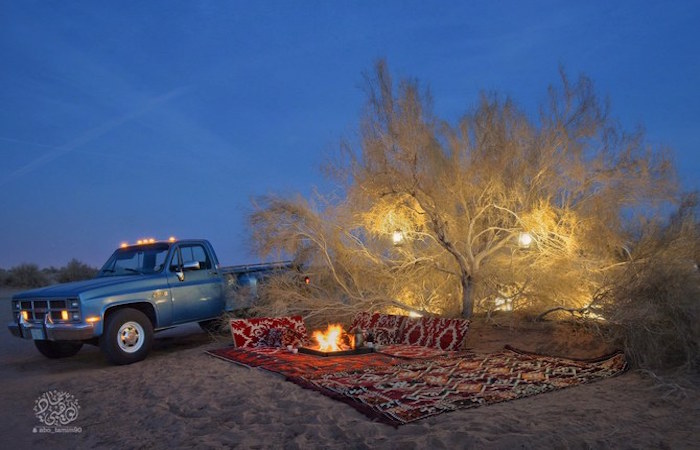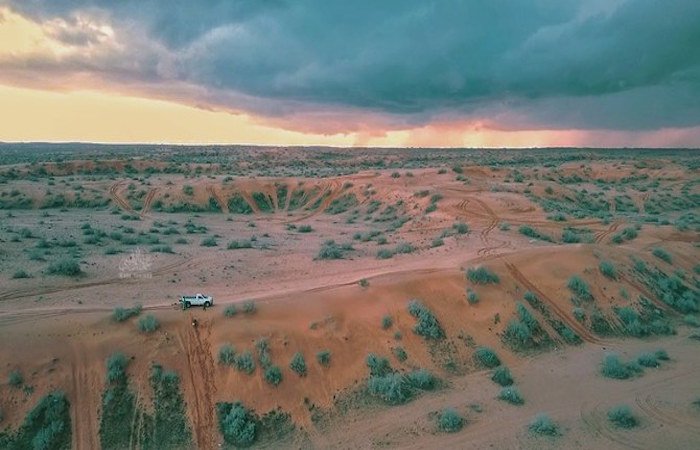
Saudi Arabia sets record for biggest saxaul tree botanical garden
MAKKAH: Al-Ghadha Park in Unaizah, which covers an area of more than 172 million square meters, has earned a Guinness World Record for the largest saxaul tree botanical garden.
The people of Unaizah, a governorate in Al-Qassim Province, have cared for the indigenous trees for more than five decades, and there are strict laws against cutting them down. Saleh bin Dakhil, a spokesperson for the Saudi Ministry of Environment, Water and Agriculture, told Arab News that the trees are synonymous with the area and its people.
“This heavy spread of the saxaul trees is due to the keenness of the people, since ancient times, to care for this tree, which later became a symbol of the province and a tourist landmark,” he said.
“The saxaul trees give the area a unique beauty and magic that draws hikers from the Qassim region and beyond.”
To preserve the trees and their environmental importance, he said the ministry has developed plans to protect them. For example, cattle that were causing the degradation and desertification of parts of the park were relocated to less environmentally sensitive areas and laws were introduced prohibiting grazing in the park.
In addition, efforts have intensified to restore degraded areas by planting trees. The Green Land of Qassim initiative, launched in June by the province’s governor, has had a significant positive impact, with local residents joining in the reforestation efforts.
“The National Center for Vegetation Development and Combating Desertification, in collaboration with the bureau of the Ministry of Environment, Water and Agriculture in Unaizah, has also organized temporary camp sites in Saxaul parks during the winter,” said bin Dakhil.
“These camps can only be set up after obtaining the necessary permits, which contain a number of conditions that contribute and help maintain vegetation and the cleanliness of the parks.
“The center has also drawn up a number of plans to preserve the parks, including increasing the number of inspectors monitoring environmental violations and applying the regulations to violators, so as to contribute to the development and sustainability of vegetation in accordance with the Kingdom's Vision 2030.”
Saleh Al-Waneen, a spokesperson for the Saxaul Association, told Arab News how the trees evolved to withstand the harsh desert climate.
“The tree grows and reproduces without any human intervention, and can go without water for many months,” he said. “In fact, this type of tree flowers, grows and thrives in the hottest temperatures in the summer without any irrigation or rain. It loves the heat and direct sun. Temperatures sometimes reach 58 C.
“The saxaul tree abhors shade and an excess of rain and water, and has a distinctive characteristic where it absorbs the little moisture in the soil from evaporation due to the high temperature.”
This helps the trees to take advantage of the sustainable ecosystem that forms around them, including plants, fungi, animals, insects, reptiles and birds.
Given the importance of the trees to the region and its people, they have also influenced local culture, inspiring poets for hundreds of years, Al-Waneen said. The association was therefore formed as an environmental organization in recognition of the ecological and cultural significance of the trees.
“The number of people volunteering to help preserve and cultivate the trees has increased in recent years, as the saxaul tree is considered one of the most important types of tree that contributes (to) stabilizing the soil, which creates an integrated desert (ecosystem) that reduces volatile soil, noise pollution and carbon pollution,” he said.
Al-Waneen added that the people of the region are working hard to implement the crown prince’s Saudi Green Initiative, and the wider Middle East Green Initiative, by identifying particularly important areas for initial cultivation efforts, which will become a model for future projects.
“We wanted to shed light on the importance of maintaining vegetation and the environment, in line with Saudi Vision 2030, in terms of developing the fauna, reducing environmental pollution, and raising community awareness of sustainable development,” he said.



























